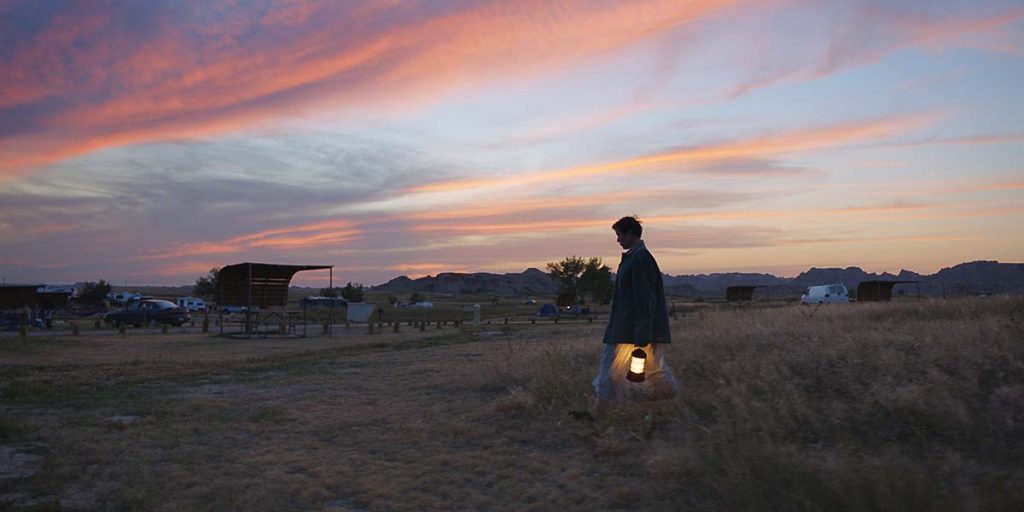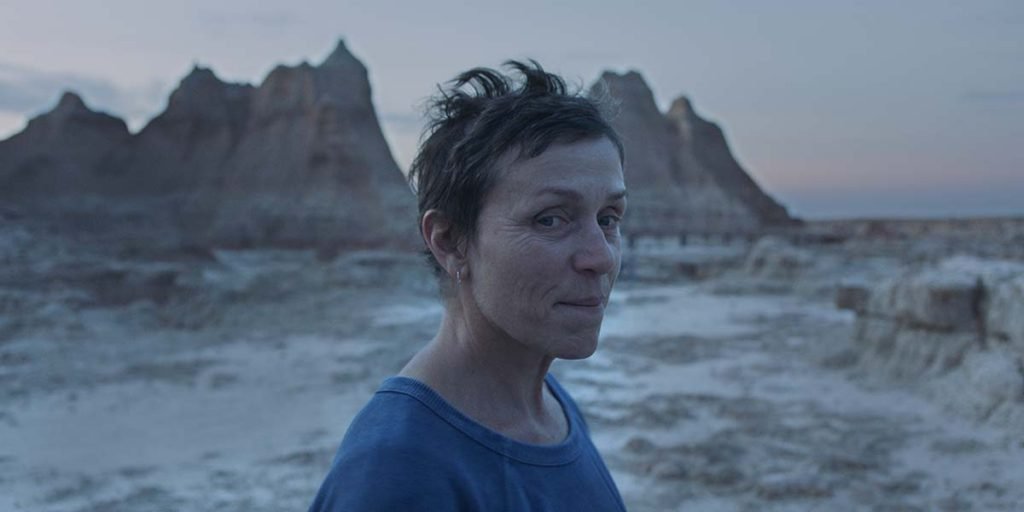Nomadland is an earnest and empathetic epic on an intimate scale, powered by Frances McDormand’s poignant lead performance.
Nomadland opens with a black screen and two white lines of text. “On January 31, 2011, due to a reduced demand for sheetrock, US Gypsum shut down its plant in Empire, Nevada, after 88 years,” the first line reads. “By July, the Empire zip code, 89405, was discontinued,” says the second.
And that’s it. That’s all the explicit insight we receive into the events that preceded the widowed Fern’s (the Academy-Award winning Frances McDormand, of Fargo and Three Billboards Outside Ebbing, Missouri) decision to embark on life as a van-dwelling nomad, and frankly, that’s all we need. There’s no bombastic backstory filmed to fill in the blanks of Fern’s past and there’s no melodramatic monologue written for her to eloquently elaborate on her emotions following Empire’s economic collapse. As a master of the cinematic form in the making, director-writer-editor-producer (try saying that five times fast) Chloé Zhao is too talented to waste time holding our hand and walking us through what’s come before, instead prioritizing the present and relying on her star’s distinguished disposition to detail any previous pains. Because, as we – and Fern – learn, Nomadland is all about acceptance and adaptation; after suffering through significant struggles, the secret to future fulfillment lies not in attempting to approximate the “good old days,” but in learning to pave new paths and to charge through any constraints that have formerly confined you.
Based on Jessica Bruder’s 2017 novel “Nomadland: Surviving America in the Twenty-First Century,” Nomadland is, at its core, a movie made of “moments.” More clearly, Chloé Zhao’s third film is a collection of curious characters and eccentric experiences loosely linked by a few tender thematic threads, aimlessly ambling from scene to scene without any sense of stress or strain. In other films, one may feel uneasy at such a lack of urgency, but here, Zhao’s drifting direction feels right at home, capturing the calm composure of her nomads and echoing their easygoing outlook on life. Her compassionate camera spotlights her subjects with so much sincerity that we too feel this warmth and inexplicably become magnetized by these migrants, unable to look away as they go about their day and complete even the most monotonous of chores. Now, much of this is due to Zhao’s deft and delicate directorial eye, but one cannot overstate the strength of the supporting cast she has assembled here as well.
Though McDormand’s Fern is indeed the protagonist of the piece with her own singular struggles (and more on those in a moment), she also functions as our audience surrogate of sorts, and she exposes us to these idiosyncratic individuals without commentary or critique of any kind, allowing them to tell their truth and share their story with stark honesty, showcasing a surplus of lost lives lived on the margins. Just as in 2018’s The Rider, Zhao makes use of “non-actors” to fill the frames of her film and add to its authenticity, and if an individual was unaware of this creative casting, they truly wouldn’t be able to tell while watching the film.

As two of Fern’s most cherished companions, Linda May and Charlene Swankie imbue the story with integrity and innocence (with Swankie receiving a showstopping scene to muse on morality that will elicit effusive emotional reactions the world over), while Bob Wells is a peculiar pleasure as a nomad “educator” who even gets his own time for a tear-jerking tale in the film’s final act. For individuals with no prior acting experience, it’s extraordinary how efficient May, Swankie, and Wells are at balancing both broad frivolity and firmness, always straying from stereotypes and constructing complete and complex characters.
However, have no fear – McDormand remains the MVP of Nomadland without a doubt, turning in what may be her best performance to date and peeling back the layers of her famously provocative personality to deliver internalized work of incredible intricacy and intimacy. Fern certainly has many of McDormand’s classic characteristics – her wacky whimsicality is as apparent as ever – but there’s also a raw restraint here that the actress has rarely revealed. As Fern fully engages in her nomadic exploits and learns the ins and outs of this lifestyle, we slowly start to see how much her despair for her dearly departed husband continues to hold her to her history – prohibiting her personal progression – and this anguish is effortlessly expressed and expanded on over the course of the film through no more than furtive frowns or suggestive sulking. If you’re expecting another barn-burning bravura performance à la Three Billboards’ Mildred Hayes, think again. And yet, though McDormand may be sporting subtler sensibilities in Nomadland, her acting is no less astounding or absorbing, displaying daring depth that draws us into a daze.
As the only other “name” actor in the cast, David Strathairn is a soft-spoken and sweet-natured friend for Fern, who eventually represents an opposing reality when he more easily embraces a return to the “real-world.” Fern faces a crossroads with how to continue on her campaign – does she give domesticity another go with a man who could potentially be a perfect life partner, or does she remain committed to her (solitary) crusade of crisscrossing across America and assessing all that the natural world has to offer? It doesn’t help that Strathairn is so classically compelling and charismatic, only increasing Fern’s indecision. Nevertheless, although the conclusion of their companionship should remain a secret, it’s no spoiler to say how satisfying it is to see these two lost souls intersect on their individual journeys and help one another advance – even if just for a bit – just as we do with people we pass paths with each and every day. This ode to fleeting, but foundational, friendships is just one of Nomadland’s jubilant joys, and McDormand and Strathairn sell it splendidly.
By all accounts, Nomadland is a technical triumph as well. Even aside from Zhao’s dynamic direction, Joshua James Richards’ captivating and consuming cinematography envelops audiences in the arresting aura and atmosphere of the film, placing us right alongside Fern on these picturesque plains. Zhao’s expedient editing is just as commendable as her directorial command, as she keeps the 108-minute chronicle moving at a clip and never lingers in one location for too long before jumping to the subsequent stop on Fern’s jubilant journey. Finally, though Ludovico Einaudi’s stirring score is used sparsely, it is extraordinarily effective when employed, mastering the mix of majesty and melancholy that can be felt through every frame of the film.
Chloé Zhao was well on her way to new heights in Hollywood after her 2015 debut feature film Songs My Brothers Taught Me and her 2018 follow-up The Rider, but Nomadland is another achievement entirely. As a folk-esque fable for the “forgotten” man and woman in America, it is both educational and empathetic, never critiquing its characters but capturing them in their totality – warts and all – to allow for an astute analysis of the lives that no one looks after anymore. With Frances McDormand’s ferocious and fearless Fern leading the way, audiences are exposed to events, environments, and experiences outside of our typical trappings, reminding us of the excitement of existence once more and challenging us to chart our own new course out of our comfort zone and towards our truth.
Nomadland premiered simultaneously at the Venice Film Festival, where it won the Golden Lion Award for Best Film, and at the Toronto International Film Festival on September 11th, 2020. It’s now available to watch on digital and on demand.

